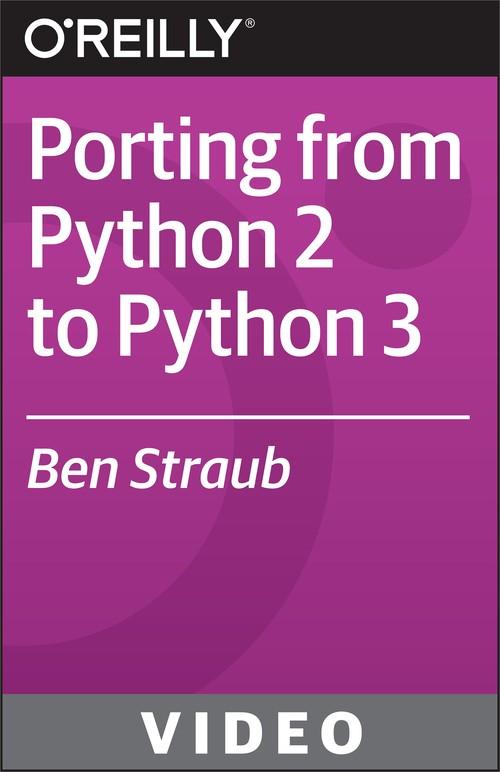Categories: Tutorials

Oreilly - Porting from Python 2 to Python 3
by | Released August 2015 | ISBN: 9781771374514
In this Porting from Python 2 to Python 3 training course, expert author Ben Straub teaches you about the changes with Python 3, and how to make a smooth transition from Python 2 to Python 3. This course is designed for users that already have Python programming experience.You will start by learning about numbers and strings. From there, Ben teaches you about exceptions, such as raising and catching, and tracebacks and chaining. This video tutorial also covers classes, IO, and library. Finally, you will learn other language changes, such as print, imports and reload, ranges, and functional operators. Once you have completed this computer based training course, you will have learned all about Python 3 changes, and how to make a smooth transition from Python 2 to Python 3. Show and hide more Publisher resources View/Submit Errata
- Introduction
- Course Introduction And What To Expect 00:01:01
- About The Author 00:00:48
- Overview
- The Situation 00:02:08
- Why Port At All? 00:02:10
- Port Versus Polyglot 00:01:34
- Helper Packages - 2to3, Futurize And Six 00:06:11
- Automated Testing - Coverage, Tox, Caniusepython3 00:03:44
- Numbers
- Numbers Overview 00:05:00
- Strings
- Text Versus Binary 00:04:17
- Unicode Strings And Characters 00:04:55
- Byte Strings 00:03:28
- Basestring, Interning And IO 00:04:12
- Exceptions
- Raising And Catching 00:02:09
- Tracebacks And Chaining 00:01:58
- Classes
- Metaclasses 00:03:16
- Iterators 00:03:44
- STR And BOOL Methods 00:02:31
- IO
- Files - Open And Read 00:03:18
- Input And Raw_input 00:02:33
- ExecFile And StringIO 00:03:23
- Library
- Collections - Counter, Ordereddict, Userdict, Userlist And Userstring 00:01:20
- DBM Modules 00:01:15
- Commands And Subprocess 00:01:03
- Web Libraries - Part 1 00:01:28
- Web Libraries - Part 2 00:02:19
- IterTools 00:02:14
- Miscellaneous Libraries 00:01:54
- Other Language Changes
- Print 00:02:16
- Repr 00:01:34
- Imports And Reload 00:02:34
- Dictionaries 00:02:24
- Ranges 00:01:35
- Functional Operators - Part 1 00:02:22
- Functional Operators - Part 2 00:04:07
- Conclusion
- Wrap Up 00:00:35
Show and hide more
Related Posts
Information
Members of Guests cannot leave comments.
Top Rated News
- Sean Archer
- John Gress Photography
- Motion Science
- AwTeaches
- Learn Squared
- PhotoWhoa
- Houdini-Course
- Photigy
- August Dering Photography
- StudioGuti
- Creatoom
- Creature Art Teacher
- Creator Foundry
- Patreon Collections
- Udemy - Turkce
- BigFilms
- Jerry Ghionis
- ACIDBITE
- BigMediumSmall
- Boom Library
- Globe Plants
- Unleashed Education
- The School of Photography
- Visual Education
- LeartesStudios - Cosmos
- Fxphd
- All Veer Fancy Collection!
- All OJO Images
- All ZZVe Vectors




 Categories
Categories







